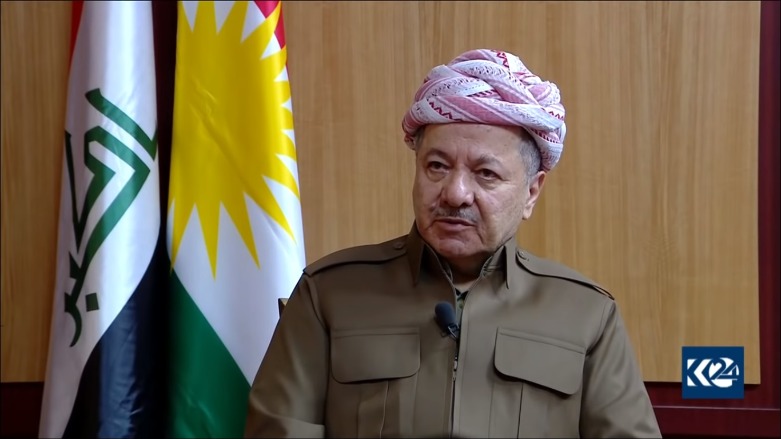Fight against Islamic State harder after military defeat: Masoud Barzani

ERBIL (Kurdistan 24) – Former Kurdistan Region President and current leader of the Kurdistan Democratic Party (KDP), Masoud Barzani, on Wednesday highlighted the ongoing challenges of fighting the Islamic State (IS) after the groups’ 2017 military defeat in Iraq and strategic turn to an insurgency.
“Da’esh (IS) is not defeated and will not be ended easily,” Barzani said in response to a Kurdistan 24 question at a press conference in Erbil’s Pirmam, adding that the fight has become more challenging as the jihadist group’s militants are now “unseen.”
The presser comes a day after the Kurdish leader returned from a tour to Iraq’s Baghdad and Najaf where he met with various officials to discuss Erbil-Baghdad relations. After Iraq, Barzani left for the UAE and Kuwait, highlighting Kurdistan’s ties with the Gulf countries.
“Then, [IS] was on the ground, now, they are underground,” added Barzani. “Da’esh has returned to a lot of the areas much worse than before.” He gave the provinces of Nineveh, Diyala, and Salahuddin as examples, where attacks by the group continue.
“They are back in force as reasons that resulted in the formation of IS and al-Qaeda before it,” Barzani explained, “had not been solved. “
“It will not be easy,” he noted, but efforts must be made to uproot those issues, otherwise IS, something similar to it, or worse will come back.
In an interview with Kurdistan 24, former Kirkuk Governor, Najmaldin Karim, explained that the problem, the unyielding supply of recruits to IS and continued terrorist activity, in Kirkuk Province at least, was local.
“Peshmerga fought [IS] bravely, and hundreds of them were killed,” Karim said. “We have their pictures, their DNA. They’re all from the area.”
“Maybe, in Syria, it was different. They came through Turkey—Islamists, but in the Kirkuk region, specifically where I’m familiar with, they’re all local.”
Editing by Nadia Riva
(Additional reporting by Kurdistan 24 correspondent Aras Ahmed)
